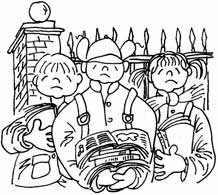Doors closing at school for migrant children
By Li Xing (China Daily)Updated: 2007-01-11 06:59
"With 500,000 yuan ($61,728) in debt, school for migrant children asks for closure."
 The banner headline in Monday's Beijing Youth Daily caught
my attention and I was truly shocked when I read further. The school that
already sent the application for its demise was none other than the Xingzhi
School in Beijing's Daxing District.
The banner headline in Monday's Beijing Youth Daily caught
my attention and I was truly shocked when I read further. The school that
already sent the application for its demise was none other than the Xingzhi
School in Beijing's Daxing District.
Xingzhi is arguably one of the best-known among the more than 200 schools for migrant children in Beijing. It has 1,200 students from preschool through ninth grade. Over the years, it has drawn a lot of media coverage as it went through twists and turns. Its pending closure means that the 1,200 children of migrant workers have to look for another school or simply drop out.
The fact that it can no longer sustain itself shows that the public as well as the government at all levels need to come up with better policies and methods to help schools like Xingzhi.
Since its opening in 2001, Xingzhi remained "illegal" and moved five times in three years. On May 24, 2004, some 750 students as well as their teachers found themselves locked out of their campus when the school failed to pay some 70,000 yuan ($8,980) in rent.
But in October that same year, Xingzhi became one of the first group of schools for migrant children in Beijing to attain legal status. Since then, almost all the news about Xingzhi has been pretty rosy, along with official eulogies.
I came to know about Xingzhi through my colleagues, who have participated in a number of activities at Xingzhi over the years. From China Daily's archives, I easily located two feature stories about Xingzhi school, which I helped edit and send for publication in the paper on December 13, 2004.
 One story began with a 6-year-old girl, Wang Xing, who hoped
the school would plant the beautiful flowers that she had painted "all around
our campus."
One story began with a 6-year-old girl, Wang Xing, who hoped
the school would plant the beautiful flowers that she had painted "all around
our campus."
In another feature, the school's founder, Huang He, told the writer that he wanted Xingzhi "to be a good school".
In May last year, Beijing Legal Evening reported that the China Red Cross donated 200,000 yuan ($25,640) to the school to help provide computers and computer-assisted teaching equipment.
Three months later when several unapproved schools for migrant children in Haidian District were forced to close down, Huang He told the local media that Xingzhi was ready to take in as many as 500 more students. And he was disappointed that only 50 came.
However, Xingzhi has remained minban, meaning "private", and thus cannot enjoy substantial government aid. Meanwhile, the children of migrant workers cannot enjoy free education in the real sense of the word because they are not Beijing residents.
As a result, the school, which charged very little or nothing for children with difficulties paying for school fees, is facing bankruptcy, with teachers' salaries three months in arrears.
To help a single school like Xingzhi may not be that difficult, and the Daxing education bureau is now trying to rally assistance from all circles.
But to help schools like Xingzhi to grow and further develop, better policies are needed to address the current divide between the permanent Beijing residents and non-residents and between the so-called public schools and "private" schools, so that all children are able to enjoy free basic education wherever they live, even without permanent resident status.
(China Daily 01/11/2007 page10)
|
|
|
|